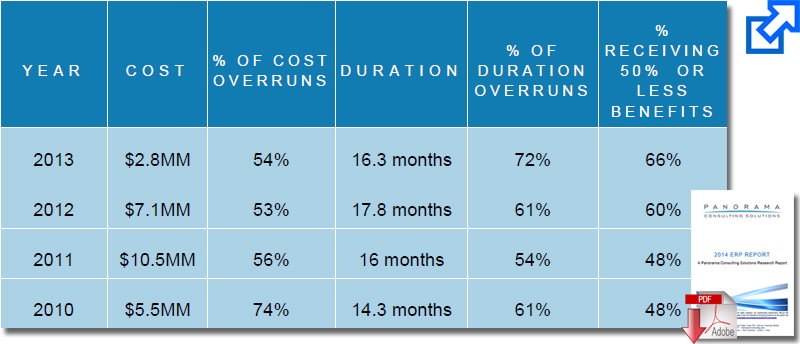66% of 2013 ERP Implementations Are Only Receiving 50% or Less Promised Benefits!
The Panorama Consulting Solutions 2014 ERP Report presents independent analysis of ERP implementation costs, durations and achievement of business benefits from both domestic and multinational organizations of varying sizes.
In a recent survey of ERP implementations conducted by the Panorama Consulting Group, it was discovered that over 66% of those ERP implementations say that they are receiving 50% or less of the promised benefits.
Additionally, the study revealed that it did not matter who the ERP vendor was, Oracle, SAP or Microsoft Dynamics. This revelation should come of no surprise to seasoned ERP professionals.
Many times the companies hire as a “General Software Contractor” the very same value added reseller who marketed and sold them the ERP solution. As companies and users become more sophisticated in their requirements, it has become unreasonable, not to mention expensive, for any one single entity to successfully implement all the various modules that exist in advanced ERP software let alone begin “enhancements” into areas that they have no deep domain expertise in. As a result, you have over commitment, under performance and customer dissatisfaction.
To be certain, the customers themselves are to be held accountable for some of their own disappointment. All too often we have seen that new software implementations are used as a club to facilitate “process re-engineering” in companies without fully understanding the organizational impact. Furthermore, user departments and communities have become subservient to misguided IT policies direction at the expense of the organization.
As it becomes increasingly difficult and expensive to implement “enterprise” ERP software, companies need to focus on removing “silos” in their decision process and making Benefits Realization an essential part of the overall initial implementation process and not as an after thought to be completed in Phase 3 or 4.
Data Summary by Year

Over the past four years of Panorama’s independent ERP research, the average cost of ERP implementations has been $6.5 million and the average duration has been 16.1 months. In this period, approximately 54-percent of projects have exceeded their planned budgets, 72-percent of projects have exceeded their planned durations and a full 66-percent of respondent organizations have received less than 50-percent of the measurable benefits they anticipated from their ERP software initiatives.
Of those respondents who exceeded their planned durations, the majority indicated that “organizational issues” was the main reason. Unsurprisingly, the data also revealed that more than half of respondents spent 0-25-percent of their budget on organizational change and business process management. These data also may explain why only eight-percent of respondents reported “excellent buy-in” among employees.
Related: Most Companies Fail with ERP for Supply Chain Orchestration












